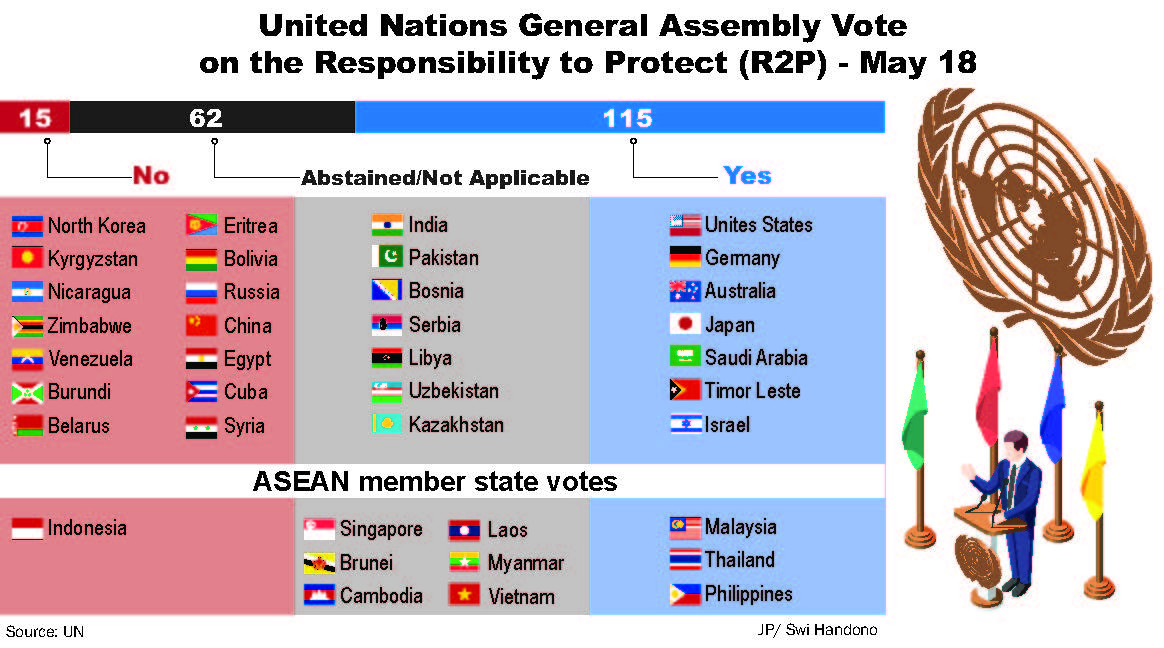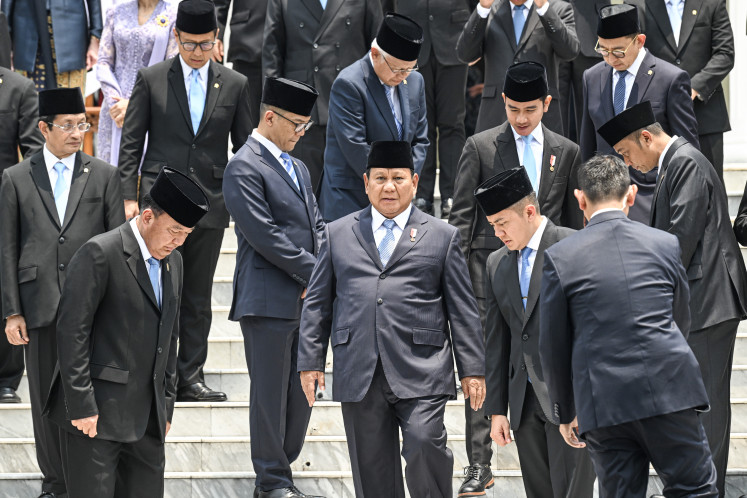Popular Reads
Top Results
Can't find what you're looking for?
View all search resultsPopular Reads
Top Results
Can't find what you're looking for?
View all search resultsUN R2P resolution substantive RI offers to host South China Sea COC talk or procedural? Experts say both
Experts believe Indonesia could have taken a better position on the Responsibility to Protect (R2P) in a recent United Nations vote on the matter.
Change text size
Gift Premium Articles
to Anyone
W
hile the United Nations has routinely invoked the responsibility to protect (R2P) to justify international interventions on humanitarian grounds, a recent vote by the UN General Assembly suggests that ideas for its implementation are varied.
Indonesian diplomats defended the country’s vote against the UNGA resolution as a principled stance against the procedural – not substantive – aspects of the agenda, amid backlash from rights groups and international relations observers.
But some experts suggest that the resolution was both procedural and substantive and that Jakarta was in a unique position to inform further debate on the matter.
R2P is an established international norm intended to prevent crimes against humanity. It was agreed upon by all UN member states, including Indonesia, in a 2005 summit.
A vote last month to officially put R2P on the annual UNGA agenda after years of informal talks received support from 115 UN member states, with another 28 abstaining and a handful of others not present for the vote.
Indonesia found itself in a group of 15 naysayers – alongside China, Russia and North Korea – but insisted that its vote was in principled opposition to what it considered a premature plan to discuss the UN mechanism more widely.
But bringing the topic to a larger forum could be the next logical step to answering Indonesia’s concerns, said Asia-Pacific Center for the Responsibility to Protect (APR2P) director Alexander Bellamy.
Read also: Indonesia votes ‘no’ on UN crimes against humanity resolution
“If we're worried that the West has been selective, why not ask difficult questions about Western governments – about the United States' immigration policy or Australia's refugee policy or its indigenous past and how we're doing or not doing enough to recognize past crimes?” he said during a webinar organized by the Jakarta-based Centre for Strategic and International Studies (CSIS) on Monday.
“[Why not] raise questions about the legacies of empire and colonialism and how these created some of the root causes of atrocity crimes in some places and what we're going to do to address that?”
Previously, Foreign Ministry director for human rights and humanitarian affairs Achsanul Habib said Indonesia’s reluctance to support R2P had to do with its muddied “selectivity” to allow intervention in certain countries and not others.
"It is worrisome that R2P action is primarily aimed at weak states, while it is very unlikely to be applied against powerful ones,” Achsanul wrote in an op-ed published in The Jakarta Post in May.
He cited Libya, where 331,000 people had found themselves in a humanitarian emergency, another 100,000 had sought refuge in neighboring countries and 287,000 had been internally displaced – all because of a military campaign carried out under the R2P banner.
UN member states, he added, should instead focus on making the concept of R2P unambiguous and preventing it from being easily politicized.
The new resolution requires the UN secretary-general to report on the subject every year at the UNGA, potentially opening the topic up to wider scrutiny and less focus.
Read also: Strategic stakes running high in ASEAN summit on Myanmar
Bellamy, who is a professor of peace and conflict studies at the University of Queensland, said Indonesia’s rejection of the UNGA resolution was “unfortunate” and that it could have been better served by taking a leadership position on the matter for future discussions.
“I think it's precisely governments like Indonesia – like South Africa, like Brazil – that have deeply felt humanitarian and human rights concerns but also have that non-Western [understanding] and history of colonization. So those critical concerns that we need to bring to the fore, they have that and so they can shape the debate,” he said.
“It would have been nice to see Indonesia take that opportunity.”
Senior CSIS researcher Lina Alexandra, who previously criticized Indonesia’s move as being harmful to its own diplomatic efforts, said the Indonesian delegation to the UN could have just chosen to abstain.
“By saying ‘yes’ or at least ‘abstain’, we can really have a dignified debate where everyone can actually contribute to shaping how the R2P should be implemented and promoted in the future,” she said during the webinar.
The timing of Indonesia’s vote could not have been worse, she said, as the country was pushing for ASEAN to respond transparently to the Myanmar military coup and help the people who had called for intervention.
The junta has failed to impose control since ousting the democratically elected government in February. Security forces have killed at least 849 protesters, one rights group says, though the army disputes that figure, and insurgencies in several regions have flared up.
Vast segments of Myanmar’s population have stood up to the military regime amid killings and arbitrary arrests, some even calling for R2P to be invoked.










